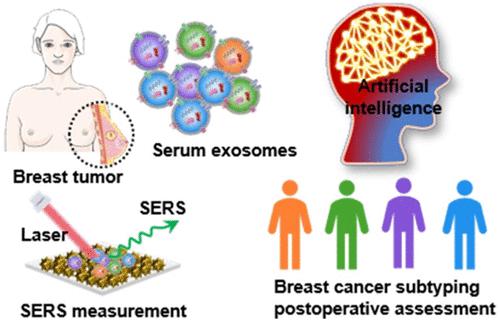当前位置:
X-MOL 学术
›
Nano Lett.
›
论文详情
Our official English website, www.x-mol.net, welcomes your
feedback! (Note: you will need to create a separate account there.)
Artificial Intelligent Label-Free SERS Profiling of Serum Exosomes for Breast Cancer Diagnosis and Postoperative Assessment
Nano Letters ( IF 9.6 ) Pub Date : 2022-09-23 , DOI: 10.1021/acs.nanolett.2c02928 Yangcenzi Xie 1 , Xiaoming Su 1, 2 , Yu Wen 1 , Chao Zheng 3 , Ming Li 1
Nano Letters ( IF 9.6 ) Pub Date : 2022-09-23 , DOI: 10.1021/acs.nanolett.2c02928 Yangcenzi Xie 1 , Xiaoming Su 1, 2 , Yu Wen 1 , Chao Zheng 3 , Ming Li 1
Affiliation

|
Breast cancer subtypes have important implications of treatment responses and clinical outcomes. Exosomes have been considered as promising biomarkers for liquid biopsies, but the utility of exosomes for accurate diagnosis of distinct breast cancer subtypes is a grand challenge due to the difficulty in uncovering the subtle compositional difference in complex clinical settings. Herein, we report an artificial intelligent surface-enhanced Raman spectroscopy (SERS) strategy for label-free spectroscopic analysis of serum exosomes, allowing for accurate diagnosis of breast cancer and assessment of surgical outcomes. Our deep learning algorithm trained with SERS spectra of cancer cell-derived exosomes is demonstrated with a 100% prediction accuracy for human patients with different breast cancer subtypes who do not undergo surgery using SERS spectra of serum exosomes. Furthermore, when combined with similarity analysis by principal component analysis, our approach is able to evaluate the surgical outcomes of breast cancer of distinct molecular subtypes.
中文翻译:

用于乳腺癌诊断和术后评估的血清外泌体人工智能无标记 SERS 分析
乳腺癌亚型对治疗反应和临床结果具有重要意义。外泌体被认为是液体活检的有前途的生物标志物,但由于难以揭示复杂临床环境中的细微成分差异,外泌体用于准确诊断不同乳腺癌亚型的效用是一个巨大的挑战。在此,我们报告了一种人工智能表面增强拉曼光谱 (SERS) 策略,用于血清外泌体的无标记光谱分析,从而可以准确诊断乳腺癌和评估手术结果。我们的深度学习算法使用癌细胞来源的外泌体的 SERS 光谱进行训练,对于未使用血清外泌体的 SERS 光谱进行手术的不同乳腺癌亚型的人类患者,其预测准确度为 100%。此外,当结合主成分分析的相似性分析时,我们的方法能够评估不同分子亚型乳腺癌的手术结果。
更新日期:2022-09-23
中文翻译:

用于乳腺癌诊断和术后评估的血清外泌体人工智能无标记 SERS 分析
乳腺癌亚型对治疗反应和临床结果具有重要意义。外泌体被认为是液体活检的有前途的生物标志物,但由于难以揭示复杂临床环境中的细微成分差异,外泌体用于准确诊断不同乳腺癌亚型的效用是一个巨大的挑战。在此,我们报告了一种人工智能表面增强拉曼光谱 (SERS) 策略,用于血清外泌体的无标记光谱分析,从而可以准确诊断乳腺癌和评估手术结果。我们的深度学习算法使用癌细胞来源的外泌体的 SERS 光谱进行训练,对于未使用血清外泌体的 SERS 光谱进行手术的不同乳腺癌亚型的人类患者,其预测准确度为 100%。此外,当结合主成分分析的相似性分析时,我们的方法能够评估不同分子亚型乳腺癌的手术结果。































 京公网安备 11010802027423号
京公网安备 11010802027423号